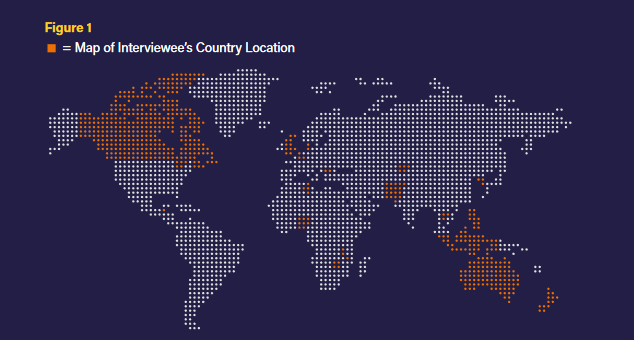How do political leaders around the world successfully create legislation which addresses gender-based violence, disability rights and LGBTQ+ rights? As David Hudson, Claire Mcloughlin, Chris Roche and Heather Marquette have discussed, it is not enough to attribute the success or failure of these initiatives to vague ideas of charismatic leadership or the field being ripe for change.
Instead, Rebecca Gordon and Victoria Hasson have set out to learn, through interview data with parliamentarians, what skills and qualities these political leaders believe enabled them to achieve success in their mobilisation for inclusive legislative change. The findings are both reassuring – in that clear, definable skills and qualities did appear to help parliamentarians create change – and concerning – in that these are often not the skills and qualities in which politicians are trained or even encouraged.

Map showing countries in the study. Created by Tom Morton/Westminster Foundation for Democracy.
The researchers interviewed political leaders in 22 countries, shown in the map above. Examples of the inclusive change legislation interviewees had worked on included the Organic Law No 2017-58 on the Elimination of Violence Against Women in Tunisia, the New Zealand Marriage (Definition of Marriage) Amendment Bill 2013, the Law on Disabilities No 8 in Indonesia in 2016 and the Transgender People (Protection of Right) Act in Pakistan in 2018.
Through these interviews, the researchers identified five essential skills and qualities, and three more that were also important but perhaps more context-specific. The skills and qualities which interviewed leaders identified they had used to enact inclusive change were as follows:
Parliamentarians need to be collaborators. The interviewees identified that they had implemented change through joining forces with others and collaborating across political ideologies and boundaries. This could involve working cross-party, or working with outside groups such as religious organisations. Crucially, it was important to be able to put the legislation above one’s broader personal position, and to be able to negotiate with those who thought differently to bring them onboard. Parliamentarians should be open to collaboration with groups or individuals who might initially be hostile to the legislation, and be able to build relationships with groups or individuals with significantly different ideologies. Collaborating widely helps persuade those sceptical of the legislation, ensure the introduction and successful passage of the legislation and crucially can change the wider conversation surrounding the issue.
Politicians need to be strategic thinkers. They must develop a plan from where they are to where they want to be, adapting to any hurdles that occur along the way. When inclusive legislation encounters opposition, politicians need to be able to frame their position strategically in a way that recognises both cultural mindset and political infrastructure.
Politicians need to be focused on their goal to implement inclusive change. Bringing about this type of change is lengthy and complex; political leaders must remain focused about their work and have clear goals they wish to achieve.
Politicians need to be relationship builders. They must be able to reach out to relevant communities, form relationships and, perhaps most importantly, listen to the people affected. Engaging with empathy is important for ensuring the legislation created is appropriate and comprehensive.
Politicians need to be open to learning. They must be able to recognise, and learn from, the expertise of others. This is fundamental to ensuring that the legislation is well designed and will have its intended effect.
The additional three skills and qualities which were identified as important, but less universally so, were being trustworthy, creative and self-aware and reflective.
Now for the cause of concern – most MPs receive little or no training in developing, strengthening or using these skills and qualities. In particular, being a collaborator is not always valued, and politicians may be discouraged from working cross-party and as a team. Working collaboratively may even damage a parliamentarian’s political career. Most current political leadership training takes place within political parties and not across political divides. However, cross-party leadership training may better strengthen collaboration skills for political leaders.
Gordon and Hasson recommend systematic and proactive outreach to encourage people likely to have the required qualities and skills to enter politics, particularly those with experience relevant for inclusive change. It is especially important to reach out to members of minoritised and marginalised groups, and their ‘prototypical’ leaders. They also recommend engagement with and skills training for existing political leaders. This can be through contextualised political leadership training, peer to peer political skills sharing, targeted political leadership resources, political soft skills development and community mentorship.
Undertaking these interventions and facilitating these connections will help support parliamentarians to develop and strengthen the skills and qualities required to work towards inclusive change. Also important is recognising the importance of these skills and qualities in general discourse; politicians should be able to feel supported in being collaborative, for example, and have others recognise the benefit of this approach.
This article is based on Rebecca Gordon and Victoria Hasson’s report Leadership for Inclusion, originally published on the Westminster Foundation for Democracy website.











